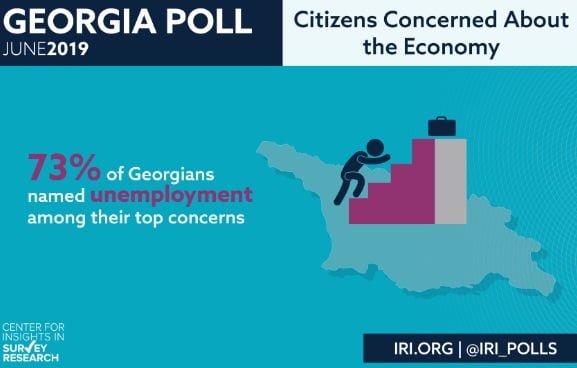Poll says the mood is somber in Georgia as the recent survey shows 22% of Georgians either don’t know or refuse to answer a question on who they vote for if the elections were held today. 66% of the respondents say the country is moving “in the wrong direction”.
For those who do answer the question, the ruling Georgian Dream-Democratic Georgia (GDDG) leads with 26% closely tracked by its arch-nemesis the United National Movement (UNM)-led United Opposition – 22%. The European Georgia/Free Democrats, trails far in the third place with 7%.
The poll showed an important downwards trend in the rate of support towards the EU (75%, down from 85% in 2018) and NATO (68%, down from 76%). The poll also shows that 79% of respondents consider Russia the biggest threat to Georgia politically.
The poll, released on July 18, was conducted by Baltic Surveys/The Gallup Organization for the International Republican Institute (IRI) between May 20-June 11, 2019.
The survey was conducted through nationwide face-to-face interviews (excluding occupied territories) with 1,500 respondents and has a margin of error of 2.5%.
Political ratings
According to the part of the public opinion survey, which examines voting intentions of respondents if parliamentary polls were held this Sunday, the ruling Georgian Dream-Democratic Georgia (GDDG) has 26% support among respondents (down from 27% in 2018).
Responses to the same question, show UNM-led United Opposition with 22% support (up from 17% in 2018), followed by the European Georgia/Free Democrats – 7% (same as last year); the Alliance of Patriots – 5% (up from 4%); the Labor Party – 5% (same as last year); and the Democratic Movement- United Georgia – 2% (down from 3%). 6% of respondents said they would vote for none of the parties and 22% either did not know or refused to answer, but additional 7% and 55%, have indicated these options as their second choice, respectively.
The survey also examines favorable/unfavorable rating of the political leaders.
Ex-speaker Davit Bakradze (European Georgia), Tbilisi Mayor Kakha Kaladze (GDDG) and UNM-led United Opposition leader Grigol Vashadze lead the pack with Bakradze having the best ration (59/34), followed by Kaladze (49/43) and Vashadze (48/43). The second tier consists of the Development Movement’s Davit Usupashvili and Labour Party’s Shalva Natelashvili.
Trust in institutions
These political ratings are part of a broader public opinion survey, which also looks into public attitudes towards multiple issues related to domestic politics and foreign affairs, including confidence in institutions.
According the poll, the Georgian Orthodox Church enjoys the highest support with 89%, compared to 84% in 2018. It is followed by the Georgian army – 87%, up from 83%; Georgian media – 70%, up from 68%; police – 52%, up from 50%; local authorities – 48%, up from 43; education system – 40%, down from 49%; parliament – 37%, up from 34%; Cabinet of Ministers – 35%, up from 34%.
Unemployment key concern
66% of respondents think that Georgia is moving in the “wrong direction,” staying at the same level (within a statistical error) from 2018 (67%). 23% think that the country is moving in the “right direction,” (22% in 2018, 21% in 2017). 11% either did not know or refused to answer.
Like previous similar surveys, the new one again shows that unemployment remains the top concern for most of the respondents, followed by cost of living/high prices, poverty, territorial integrity and education.
EU, NATO, Russia relations
A notable annual downturn was registered in support towards membership in Euro-Atlantic bodies: 75% of respondents are supportive of Georgia’s European Union membership (down from 85% in 2018), whereas the support for joining NATO stands at 68% (down from 76% in 2018).
30% of respondents believe that Georgia’s foreign policy approach should be only “pro-EU/pro-Western” (up from 27% in 2018), while 47% think that it should be “pro-Western” but the country should, simultaneously, “keep up relations with Russia” (down from 50%). 8% want Georgia to be “pro-Russian but remain an ally of the EU/the West” (down from 11%), and 2% would like to see Georgia “pro-Russian” only (same as last year).
Georgian government’s handling of relations with Russia is assessed positively by 33% of respondents (down from 34% in 2018) and negatively by 52% (same as last year); 79% of respondents think that Russia is a “threat” (down from 85% in 2018).
Media preferences
Georgian television channels remain the main source of information about current international affairs for 85% of respondents (90% in 2018), followed by social media and Georgian internet news – 20% and 14%, respectively (11% and 22% in 2018).
4% of respondents identified Russian TV as the main source of information on international affairs, which is down by 2% compared to 2018.
37% of respondents said that they trust Imedi TV (up from 31% last year), 34% – Rustavi 2 TV (down from 38%), 4% – TV Pirveli (up from 2%).
This post is also available in: ქართული (Georgian) Русский (Russian)

